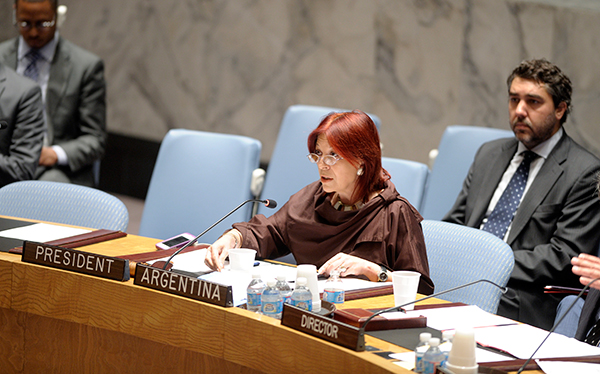
On August 23, the U.N. Security Council issued a presidential statement addressing the ongoing situations in Sudan and South Sudan, breaking nearly a yearlong silence on the issue. In their statement, the Council urged the two countries to implement previous agreements, respect the mechanisms already operating within the countries, and renew their focus on the outstanding issues, mainly the continuance of oil flow and a process to determine the final status of the disputed Abyei region. The attention of the United Nations comes at an important time preceding the halt of oil flow on September 6, Sudan’s rejection of the AUHIP-proposed referendum for Abyei in October, and ongoing aerial bombardments in South Kordofan and Blue Nile states.
Despite the reported $800 million profits from oil flow since last June, the government of Sudan reiterated its stance to halt the flow of South Sudanese oil as investigations over rebel support remain unresolved. The Security Council’s statements urged continued commitment to negotiations regarding oil transportation as a critical step towards easing tensions and improving economic prospects for both countries. Additionally, the Council called for a cessation of hostilities and humanitarian access in the areas of South Kordofan and Blue Nile, where thousands of civilians have been suffering since early this year. While the U.N. addressed these critical components of the ongoing conflict in Sudan, Enough Project Co-Founder, John Prendergast, highlighted potentially volatile situations needing further attention,
“After almost a year of silence, the Security Council’s call on Sudan to allow unfettered humanitarian access to the Two Areas will help bring this often neglected crisis back to the world’s attention. However, their failure to mention a self-determination referendum for Abyei or reference the need for a comprehensive approach to Sudan’s conflicts means more must be done.”
The Security Council also issued a press statement on the increasing violence in Jonglei. This marked the first time the Security Council has addressed the deteriorating humanitarian situation and recent violence in Jonglei state, South Sudan. The Security Council called on all armed parties to exercise restraint and refrain from violence against civilians and emphasized the need for safe, unrestricted humanitarian access to affected areas. Sudan and South Sudan Policy Analyst at the Enough Project, Akshaya Kumar, welcomes the Security Council’s spotlight on Jonglei,
“In a major shift, for the first time, the Security Council expressed concerns about attacks against civilians by militias and the South Sudanese army in Jonglei state. International attention to this humanitarian crisis unfolding in the dark is welcome. We must do more to support inclusive peace and mediation efforts to negotiate a political solution and end the violence in Jonglei.”
Since the beginning of this year, an estimated 100,000 people have been displaced by violence in the area, with little access to resources and increased exposure to the rainy season conditions.
Coupled with the press statement, the U.N. mission to South Sudan, or UNMISS, intensified patrols in Jonglei’s Pibor and Gumurk towns, to help create a secure environment for civilians to safely access food distribution. Moreover, the Council recognized President Salva Kiir for his commitment to accountability for those responsible for crimes. Currently, several South Sudanese high ranking officers are being investigated for alleged human rights abuses in eastern Jonglei. These processes of protection and accountability are important steps towards breaking cycles of impunity and creating an inclusive peace in the Sudans.
Photo: María Cristina Perceval, Permanent Representative of Argentina to the UN and President of the Security Council for the month of August, chairs the Council meeting on Sudan and South Sudan. (UN)

